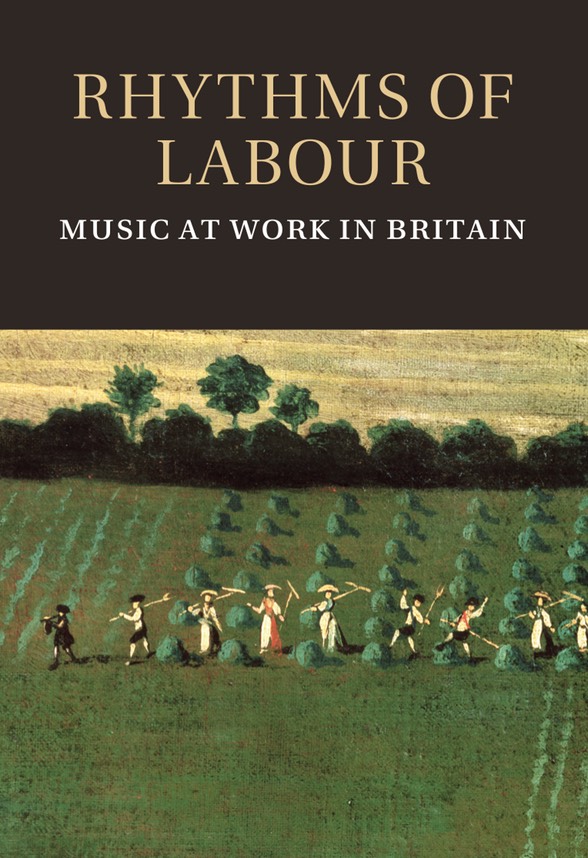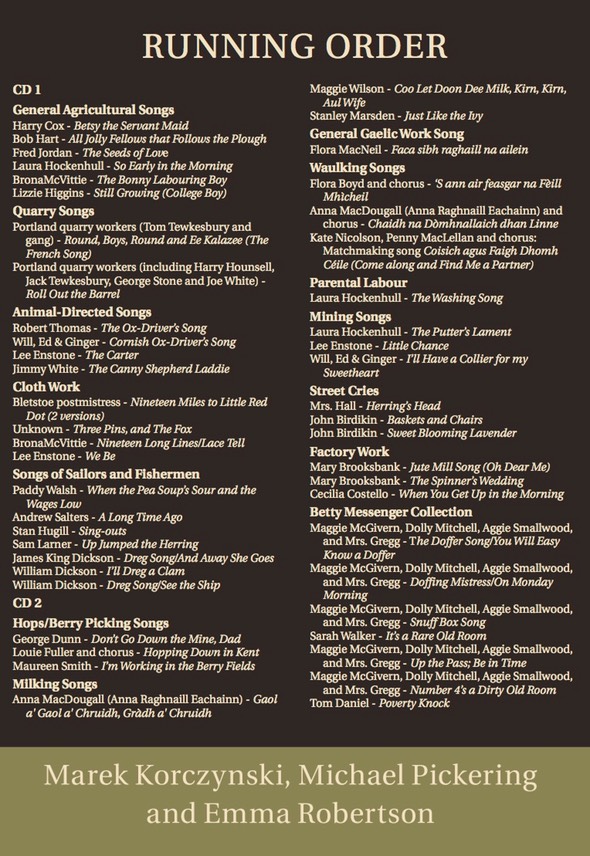

£10.00 inc P&P
Rhythms of Labour:
Hearing the Lost Singing Voices of Workers in the British Isles
Behold
her, single in the field,
Yon
solitary Highland Lass!
Reaping
and singing by herself;
Stop
here, or gently pass!
Alone
she cuts and binds the grain,
And
sings a melancholy strain;
O
listen! for the Vale profound
Is
overflowing with the sound.
(1st
stanza of William Wordsworth’s The
Solitary Reaper)
In The Solitary Reaper, Wordsworth created an evocative celebration of singing at work. He was not alone among Britain’s great poets and writers in referencing people singing at their work. William Shakespeare, Robert Burns, Thomas Hardy, George Eliot, and D. H. Lawrence all used description of people singing while working within their writing. Although fictionalised, such representations indicate shared understandings, across many centuries, of labour accompanied by song. In our linked book, Rhythms of Labour: Music at Work in Britain (Cambridge University Press, 2013), we show that singing at work was, indeed, common across the majority of the most populous pre-industrial occupations. The spinners sang, the weavers sang, the knitters sang, the sailors sang, the ploughmen sang, the cobblers sang, the tailors sang, the waggoners sang, some fishermen and fish-gutters sang, the harvesters sang, the women at the waulking sang, the dairymaids sang, the washerwomen sang, the hop-pickers sang, the stone-breakers sang and even some mine-workers sang. We cannot claim that we would have heard them all the time over centuries, and in every place, but there is enough evidence to indicate the existence of enduring cultures of singing at work.
This CD release has been compiled to let us hear something of these singing cultures, and to celebrate them, as well. It has also been compiled to right the wrong that our historical knowledge of singing at work in the British Isles extends little beyond a passing acquaintance with some shanties. We are concerned here with hearing singing at work, rather than with songs about work. The two need to be distinguished from each other. Sometimes, singing at work did feature descriptions of elements of the work process, but, more often, it did not. Further, most songs about work were not sung at work. In addition, we want to hear singing at work, and not just work songs. Work songs are a genre of song, sung within, and created for, the work process, where key elements of the song are directly functional for the nature of the work undertaken. Sailors’ shanties are the most commonly known form of work song - shanties were used to directly coordinate and pace the labour of sailors. Most singing at work was not confined to this narrow genre of work song. Singing at work could feature a whole range of songs popular at the time – whether these were music hall songs, blackface minstrel songs, religious songs, or improvised songs of satire set to commonly known melodies. In many singing at work cultures what mattered more than the song was the actual process of the singing, itself. Consider this description and exchange from Ronald Blythe’s classic account of village life in East Anglia, Akenfield:
Twenty men and boys scythed
the corn and sang as they went.
Q: ‘What was the song,
Davie?’
Davie: ‘Never mind the song –
it was the singing that counted.’
We have been just as promiscuous as singing at work cultures in our choice of song types for this album. Here, you will hear work songs, beside musical hall songs, beside minstrel songs, beside popular traditional songs, beside sing-along pub songs. And what we hope for is that, with some help from the context provided in the liner notes, these songs can begin to be heard as sung at work. Gladly, some recordings actually do feature the noises of the work process, but when they do not, this CD asks us to re-imagine the singing of these songs within the work setting, and to consider all the various forms of meanings that workers might attach to them in their specific workplaces.
In the Rhythms of Labour book, we examine the meanings that singing at work had for people under three main headings. First, singing at work offered both fancy and function – the singing of songs allowed people’s imaginations to flower, just as they helped the flow of the work to be accomplished. Second, singing at work helped express and create a sense of community among people at work. There can be no clearer or more elemental statement of this than the tailors’ song included here, We Be.All Jolly Fellows who Follow the Plough Finally, singing at work also offered workers the opportunity of raising their voice, in the metaphorical sense of airing interests and grievances. Our notes below ask us to re-consider one of the most commonly collected traditional songs in England, , in light of the way it helped workers express their voice.
To honour the process of singing within the work context, we have ordered the recordings on this CD by occupation. Most of the singing on this CD comes from workers whose jobs had not yet been industrialised. In the main, industrialisation brought musical silence to workplaces – either because of employers explicitly banning singing at work, or because of the roar of industrial machinery. But some pockets of singing at work did continue in some factories. The last singing on this compilation features songs known to have been sung in factories. The tone is noticeably darker, as workers, in part, express their experience of alienation within the workplace. Mary Brooksbank’s The Jute Mill Song, and Tom Daniel’s Poverty Knock are good examples of this.
We feature songs from England, from Wales, from Scotland and from Northern Ireland, in our attempt to celebrate this singing at work across the British Isles. We have used three main sources of song material. We use songs sung by workers that were recorded by collectors from the 1920s and 1930s on. These were found in archives such as The School of Scottish Studies Archive at the University of Edinburgh, and the National Sound Archive in the British Library. Because industrialisation came early to Britain, and industrialised many occupations before the invention of audio recording technology, we could not just rely on these audio-recordings. We also had to turn to songs (referenced as sung at work) that were collected by hand by earlier waves of song collectors. In these cases, Bob Thomas and Gordon Jones (from the Harbourtown label) and Sam Lee helped us by asking some contemporary singers of traditional song to offer new versions of the songs. We are delighted that Laura Huckenhull, Brona McVittie, John Birdikin, Lee Enstone, and Will, Ed and Ginger were happy to take part in this. Finally, we also draw on some songs known to have been sung at work that have been available on a range of labels which specialise in traditional song.
Our aim, within the limitations posed by the availability of source material, has been to show singing at work across a range of occupations, across a range of time periods, and across a range of locations. Our aim has been to celebrate this singing at work in all its vibrant diversity, and to help re-kindle our historical memory of this widespread and important musical practice. In the same way as Wordsworth ends The Solitary Reaper, let us keep this singing with us:
I
listen'd, motionless and still;
And,
as I mounted up the hill,
The
music in my heart I bore,
Long
after it was heard no more.
Rhythms of Labour CD Track listing
CD 1
General Agricultural Songs
1. Harry Cox - Betsy the Servant Maid (P)2000 Topic Records Ltd. from the album ‘The Bonny Labouring Boy’ TSCD512D
2. Bob Hart - All Jolly Fellows that Follows the Plough
3. Fred Jordan - The Seeds of Love (p)1974 Topic Records Ltd from the album “When the Frost is on the Pumpkin”
4. Laura Hockenhull - So Early in the Morning Trad arr Laura Hockenhull. Pub Harbourtown Music
5. Brona McVittie - The Bonny Labouring Boy Trad arr Brona McVittie. Pub Harbourtown Music
6.
Lizzie Higgins -
Still Growing (College Boy) Trad arr Higgins. Pub Springthyme
Quarry Songs
7. Portland quarry workers (Tom Tewkesbury and gang) - Round, Boys, Round and Ee Kalazee (The French Song)
8.
Portland quarry
workers (including Harry Hounsell, Jack Tewkesbury, George Stone and Joe White)
- Roll Out the Barrel Vejvoda/Brown pub Shapiro/Bernstein (P) 2007 Topic Records
Ltd
Animal-Directed
Songs
9. Robert Thomas - The Ox-Driver’s Song
10. Will, Ed & Ginger - Cornish Ox-Driver’s Song Trad arr Will, Ed & Ginger Copyright Control
11. Lee Enstone - The Carter. Trad arr Lee Enstone. Pub Harbourtown Music
12. Jimmy White - The Canny Shepherd Laddie (P)2007 Topic Records
Ltd.
Cloth Work
13. Bletstoe postmistress - Nineteen Miles to Little Red Dot (2 versions)
14. Unknown - Three Pins, and The Fox
15. Brona McVittie - Nineteen Long Lines/Lace Tell. Trad arr Brona McVittie. Pub Harbourtown Music
16. Lee Enstone - We Be. Trad arr Lee Enstone. Pub Harbourtown
Music
Songs of Sailors
and Fishermen
17.Paddy Walsh - When the Pea Soup’s Sour and the Wages Low (P2007 Topic Records Ltd.
18. Andrew Salters - A Long Time Ago
19. Stan Hugill - Sing-outs (P)2007 Topic Records Ltd
20. Sam Larner - Up Jumped the Herring (P)1999 Topic Records Ltd. from the album Singing The Fishing’ TSCD511
21. James King Dickson - Dreg Song/And Away She Goes
22. William Dickson - I’ll Dreg a Clam
23. William Dickson - Dreg Song/See the Ship
CD 2
Hops/Berry Picking Songs
1. George Dunn - Don’t Go Down the Mine, Dad
2. Louie Fuller and chorus - Hopping Down in Kent
3.
Maureen Smith -
I’m Working in the Berry Fields
Milking Songs
4. Anna MacDougall (Anna Raghnaill Eachainn) - Gaol a’ Gaol a’ Chruidh, Gràdh a’ Chruidh
5. Maggie Wilson - Coo Let Doon Dee Milk, Kirn, Kirn, Aul Wife
6.
Stanley Marsden -
Just Like the Ivy
General Gaelic
Work Song
7.
Flora MacNeil -
Faca sibh raghaill na ailein? (P)2007 Topic Records Ltd.
Waulking Songs
8. Flora Boyd and chorus - ‘S ann air feasgar na Fèill Mhìcheil
9. Anna MacDougall (Anna Raghnaill Eachainn) and chorus - Chaidh na Dòmhnallaich dhan Linne
10. Kate Nicolson, Penny MacLellan and chorus -
Matchmaking song Coisich agus Faigh Dhomh Céile (Come along and Find Me a
Partner)
Parental Labour
11. Laura Hockenhull - The Washing Song Trad arr Laura
Hockenhull. Pub Harbourtown Music
Mining Songs
12. Laura Hockenhull - The Putter’s Lament Trad arr Laura Hockenhull. Pub Harbourtown Music
13. Lee Enstone - Little Chance Trad arr Lee Enstone. Pub Harbourtown Music
14. Will, Ed & Ginger - I’ll Have a Collier for my
Sweetheart
Street Cries
15. Mrs. Hall - Herring’s Head
16. John Birdikin - Baskets and Chairs
17. John Birdikin - Sweet Blooming Lavender
Factory Work
18. Mary Brooksbank - Jute Mill Song (Oh Dear Me) Brooksbank/Springthyme
19. Mary Brooksbank - The Spinner’s Wedding Brooksbank/Springthyme
20. Cecilia Costello - When You Get Up in the Morning
Betty
Messenger Collection
21. Maggie McGivern, Dolly Mitchell, Aggie Smallwood, and Mrs. Gregg - The Doffer Song/You Will Easy Know a Doffer
22. Maggie McGivern, Dolly Mitchell, Aggie Smallwood, and Mrs. Gregg - Doffing Mistress/On Monday Morning
23. Maggie McGivern, Dolly Mitchell, Aggie Smallwood, and Mrs. Gregg - Snuff Box Song
24. Sarah Walker - It’s a Rare Old Room
25. Maggie McGivern, Dolly Mitchell, Aggie Smallwood, and Mrs. Gregg - Up the Pass; Be in Time
26. Maggie McGivern, Dolly Mitchell, Aggie Smallwood, and Mrs. Gregg - Number 4’s a Dirty Old Room
27. Tom Daniel - Poverty Knock